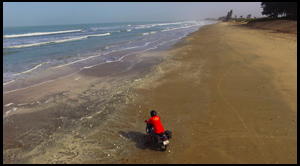One more day to give to Afia, Akosua, and Jennifer. If you don’t know what I’m talking about, click here.
If you broke down the Smell of Accra into its component parts, burning plastic would take a large part of the pie. There is no municipal garbage collection and trash is often incinerated by individuals. If it’s not set on fire it’s swept into the gutter. Walk down any street in Accra and you will see open sewers choked with trash. The garbage eventually makes its way to the ocean. It then follows the current and washes up in places like Ada, a village that looks like an open-air landfill despite producing very little waste itself.
Most of the trash comes from plastic sachets of “pure water.” While it is inexpensive and generally hygienic to distribute water in a sealed plastic bag, the environmental cost is enormous. Trashy Bags is a non-profit in Ghana that is using the discarded sachets to make a variety of fashionable reusable bags.
All these bags were destined for incineration or ocean. They will be made into lunchboxes and handbags instead.
One end of the sachet is cut so that the bags can be cleaned inside and out. The scraps are sent to a separate company that recycles them.
The bags are then washed.
Dried.
And then sewn together.
Notice the fish bag made with fan milk sachets. One of the coolest stories I heard was that the woman in the background in the black shirt was originally selling pure water sachets on the side of the road. This is a job with little profit and long hours of breathing diesel fumes. After a soccer match in Accra she saw trashy bags employees collecting sachets around the stadium. The employees told her they would pay her to help them collect. She told them she could sew and now she is employed by the company and receiving a living wage. The two women in red in the picture both have babies. They are allowed to bring them to work. Looking after the babies is a collective effort. They are affectionately called “Trashy Babies.”
The organization is impressive. Sixty people are employed, receiving wages that are comparatively better than what they would receive elsewhere. In addition to those officially employed, there are many individuals who collect the sachets around the city, receiving a sum of money when they deliver their haul to the company. Those who join the company as washers are taught how to sew so they can work their way up the pay scale and learn a new skill at the same time. There are incentives for output and innovation and the company has a yearly competition between teams of employees to develop a new product. After talking to several employees who clearly took pride in their work, I realized that this company is doing a lot of things right.
I would encourage you to support Trashy Bags in one way or another. Send an email to a company that might be interested in carrying their products. Tell a friend about them. Check out their website: http://trashybags.org/











I admire this concept greatly! Welldone! Good job!
How will you support me to set up a similar company in Lagos, Nigeria. I am very determined and serious .Thanks